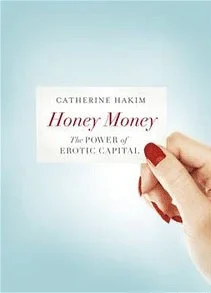Labs Method statement
YouGovLabs research is anecdotal, with polls being open to anyone who wishes to take part. In contrast to YouGov’s Public Opinion polling, YouGovLabs seeks to understand the attitudes of specific subsets of people: sports fans tell us how they feel about sports and music fans tell us how they feel about music, for example. YouGovLabs results are unweighted, and figures reported do not reflect the attitudes of the population as a whole
When you think over the triumphs and successes of your life so far, what would you accredit them to?
Your intelligence and ambition? Your integrity, and hard-working attitude? What about your social connections? Or how about your good-looks, charisma, social dynamism, and even your ‘allure’? In other words, thinking of this latter group of attributes, have you ever used what author and LSE sociologist Catherine Hakim would call your ‘erotic capital’?
In a recent survey we asked visitors to PoliticsLab with opinions on the subject to consider the issue of ‘erotic capital’ – whether or not they thought it was valued or important in society, if and when it had come into play for them, and how they felt about it. The sample was made up of respondents who said that they were interested in the topic, and agreed to take part by coming to the YouGov Labs website.
Erotic capital: the concept
Catherine Hakim unleashed the term ‘erotic capital’ earlier this year with her controversial book, Honey Money: The Power of Erotic Capital. Hakim pitches her notion of ‘erotic capital’ as a “nebulous but crucial combination of beauty, sex appeal, skills of self-presentation and social skills … which makes some men and women agreeable company and colleagues, attractive to all members of society and especially the opposite sex.”

The responses to our open-panel experiment largely suggested that these attributes are generally valued in UK society. As participants often observed, the idea that a person’s beauty, attractiveness and charisma could help them secure success is far from new, and the notion of ‘sleeping one’s way up the ladder’ is so age-old it’s almost quaint.
But should we, as Hakim argues, make the most of these physical and social ‘assets’ to get ahead? Are these the right ways to ‘get on’ in life? Should erotic capital matter? Shouldn’t we have a different standard?
What ensued in the responses to our open-panel experiment, was debate around ‘the reality’ of social politics, sexual inequality and sexism, and the strength of meritocracy in the workplace.
- Those who said that erotic capital was socially important seemed unable to come to a consensus on whether it was negative or positive.
- Participants who felt erotic capital wasn’t of social value overwhelmingly found the concept to be negative.
Overall, our participants’ support for the supposedly ‘killer combination’ was less than overwhelming.
We look below at how PoliticsLab participants’ opinions were split over the issue of erotic capital, from the matter-of-fact ‘this is just how the world works’, to outright indignation that beauty and sex appeal could be factored-in as ‘the norm’ on the path to success …
1. Those in favour: The Sex Factor

A sizeable majority of our PoliticsLab participants who said erotic capital had clout in broader society said there had been moments in their lives where they thought their ‘erotic capital’ had come into play.
When asked to pinpoint which of Hakim’s four erotic capital components they felt had been most effective in this situation:
- ‘Good social skills’ and the ability to present yourself well were the most popular options
- While ‘sex appeal’ came third
- And beauty fourth
When those who were happy to disclose them spoke of these ‘moments’, they often cited being interviewed for a job, or holding a position as the ‘face’ of a company or organisation, as situations in which they had notably employed their physical and social ‘assets’.
Among the participants, there was talk of how a polished appearance and patter has all been part and parcel of their success in interview and their career, supplementing their academic record, or standing in for a weaker one, while others spoke of how they had made use of their ‘feminine wiles’. As one anonymous participant expanded:
"As a young woman I exploited it for everything from having a drink bought to getting a job, much to the disgust of feminist friends. I considered it to be enlightened feminism to accept that men and women are different and to use that to my advantage. I still pull out all the stops on occasion, but as my erotic capital has decreased I have found other ways of achieving my goals" - Anonymous PoliticsLab participant

Where some in PoliticsLab remarked that the beauty of erotic capital components was that they could be strengthened or cultivated, for other PoliticsLab participants such as Zoe S., their attractiveness, sex appeal, good social and self-presentation skills, were simply an innate collection of attributes that they weren’t necessarily aware was setting them apart:

"Erotic capital is responsible for me being able to open doors and get in the room with people who would never know who I was otherwise. People talk to me in the street, on planes, everywhere ... I used to think it was because I was nice and I smile often, which is true; but how would they know I have an MBA, four children, have economic or social connections? They want to connect because of what they see, what they feel and their experience when we communicate" – Zoe S., PoliticsLab participant
"Even if you are not going to go straight from 'boardroom to bedroom' an employer is more likely to hire someone with the Sex-Factor"
Not that these PoliticsLab participants would advocate sleeping with a superior to get ahead – the vast majority of them said it would be immoral – but there was a thread of feeling that erotic capital meant that a candidate who appeared to prospective bosses to be amiable, well turned-out or even ‘easy on the eye’ would naturally be selected on the strength of these first impressions when compared to someone who took less care over their appearance, or was more introverted.
“Everyone likes to be in the company of people they find attractive”, reasoned one PoliticsLab participant. “To be attractive to others and not to use that in life is inconceivable. If you are nice to others they will tend to be nice back to you. Simple.”
2. Those opposed: 'A disservice'
However it was the 'erotic' in 'erotic capital' ‒ the concept’s particular emphasis on making use of beauty and sex appeal ‒ that the PoliticsLab participants who disagreed with its social role found most troubling.
These strong remarks from one anonymous commenter reflect the concerns held by some participants that promoting beauty and sex appeal as ‘tools’ for success in life does a disservice to women, and a working culture which should be built solely on merit:
"I feel that pushing women to be even more conscious and critical of their appearance than they already are (having been bombarded on a daily basis by thousands of images of airbrushed women, having had it shoved down their throats since girlhood that their worth only resides in their appearance, etc) is not just wrong but immoral as well.

People (of both sexes) should be celebrated for who they are and what they have achieved (by their own standards and terms) rather than by what they look like - and I feel that the sooner women are judged LESS on their appearance and more (like men) on a variety of criteria the better. It is this double standard, i.e. the fact that it is WOMEN who should push "beauty" rather than men, that Hakim seems to be pushing that I find sexist, offensive and potentially psychologically damaging - we need MORE diverse role models for young girls, of all types including those whose qualities and achievements are not based on their appearance, not less." - Anonymous PoliticsLab participant
Continuing in this vein, the arguments from those who felt erotic capital shouldn’t hold a privileged position in British society indicated desires for wider social change. Our culture is too underpinned by sex, it was often remarked, and what should be promoted instead is a culture of “good, healthy, trustworthy communication”, where individuals who have achieved success through “character traits such as ambition, intelligence and risk-taking”, or “kindness, efficiency, problem-solving and practicality”, are brought to the fore as alternative role models.
Comments made by PoliticsLab participants on this side of the debate concluded that when it comes down to it, “capability can’t be measured by appearance”, and “we need to start valuing people for what they can contribute to society."
"'Beautiful' people are everywhere," remarked one PoliticsLab participant. “But so are the obese, the short, the gangly and the sartorially-challenged. Business life, in fact life full stop, is not a GQ photo feature or FHM cover.”

Labs Method statement
YouGovLabs research is anecdotal, with polls being open to anyone who wishes to take part. In contrast to YouGov’s Public Opinion polling, YouGovLabs seeks to understand the attitudes of specific subsets of people: sports fans tell us how they feel about sports and music fans tell us how they feel about music, for example. YouGovLabs results are unweighted, and figures reported do not reflect the attitudes of the population as a whole






